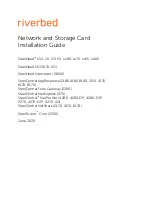
181
APPENDIX
In the illustration, volume 1 can be assigned a RAID level 5 of
operation while volume 0 might be assigned a RAID level 1E of
operation. Alternatively, the free space can be used to create vol-
ume 2, which could then be set to use RAID level 5.
Ease of Use Features
•
Foreground Availability/Background Initialization
RAID 0 and RAID 1 volume sets can be used immediately after
creation because they do not create parity data. However, RAID
3, 5, 6, 30, 50 or 60 volume sets must be initialized to generate
parity information. In Background Initialization, the initializa-
tion proceeds as a background task, and the volume set is fully
accessible for system reads and writes. The operating system
can instantly access the newly created arrays without requir-
ing a reboot and without waiting for initialization to complete.
Furthermore, the volume set is protected against disk failures
while initialing. If using Foreground Initialization, the initializa-
tion process must be completed before the volume set is ready
for system accesses.
• Online
Array Roaming
RAID controllers store RAID configuration information on the
disk drives. The controller therefore protects the configuration
settings in the event of controller failure. Online array roaming
allows the administrators the ability to move a complete RAID
set to another system without losing RAID configuration infor
-
mation or data on that RAID set. Therefore, if a server fails,
the RAID set disk drives can be moved to another server with
an Areca RAID controllers and the disks can be inserted in any
order.
•
Online Capacity Expansion
Online Capacity Expansion makes it possible to add one or more
physical drives to a volume set without interrupting server op-
eration, eliminating the need to backup and restore after recon-
figuration of the RAID set. When disks are added to a RAID set,
unused capacity is added to the end of the RAID set. Then, data
Summary of Contents for ARC-1880 Series
Page 9: ......
















































